Time for topical questionspublished at 14:03 GMT 20 November 2018

The climate change committee is taking evidence on the Climate Change (Emissions Reduction Targets) (Scotland) Bill
Urgent Question : To ask the Scottish government what support it is providing to those affected by the announced closure of the New School, Butterstone.
MSPs will be updated on the Best Start Grant
MSPs debate the development of digital industries
A Labour MSP leads a debate on offshore wind
Louise Wilson and Craig Hutchison

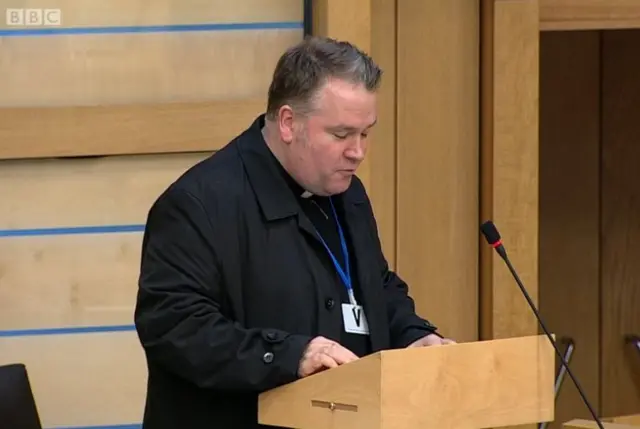
Time for reflection is being delivered by Father John Morrison from St Fergus Catholic Church in Paisley.
 Image source, SPL
Image source, SPLAfter topical questions on child poverty and kelping, there will be an urgent question on the closure of a school for children with significant additional support needs.
Social Security Secretary Shirley-Anne Somerville will then update MSPs on the Best Start Grant.
The Best Start Grant will replace the Sure Start Maternity Grant and will see a one off grant of £600 for the first child in low income families (a £100 increase on the current rate). It will also reintroduce a £300 payment for subsequent children and two payments of £250 each during a child's early years.
After that, the Scottish government leads a debate on developing digital industries before Labour MSP Lewis Macdonald uses a member's debate to highlight Offshore Wind Week.
Allow X content?
This article contains content provided by X. We ask for your permission before anything is loaded, as they may be using cookies and other technologies. You may want to read X’s cookie policy, external and privacy policy, external before accepting. To view this content choose ‘accept and continue’.
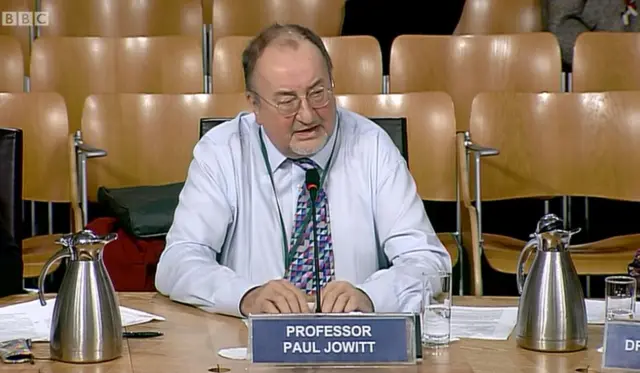 Image source, bbc
Image source, bbcProfessor Paul Jowitt from Heriot Watt University
Professor Paul Jowitt from Heriot Watt University says the use of carbon credits is "slightly dishonest"
Prof Jowitt goes on to say: "It seems like donating money to the charity for fallen women while still using the brothel."
If we think carbon is important we should reduce the use of it and not buy credits from poorer countries, he adds.
Allow X content?
This article contains content provided by X. We ask for your permission before anything is loaded, as they may be using cookies and other technologies. You may want to read X’s cookie policy, external and privacy policy, external before accepting. To view this content choose ‘accept and continue’.
 Image source, Getty Images
Image source, Getty ImagesIs the 2030 target in the bill sufficiently challenging, asks Green MSP Mark Ruskell.
Mr Leveque explains the targets could be met but it is about the costs and how the targets are achieved.
The Scottish government introduced a new Climate Change Bill to make the targets even more ambitious.
This includes amending the 2020 target to 56% and the 2050 target to 90%.
It also sets interim targets of 66% for 2030 and 78% for 2040.
However the Scottish government is to seek fresh independent advice on its climate change targets after the latest warning on rising global temperatures.
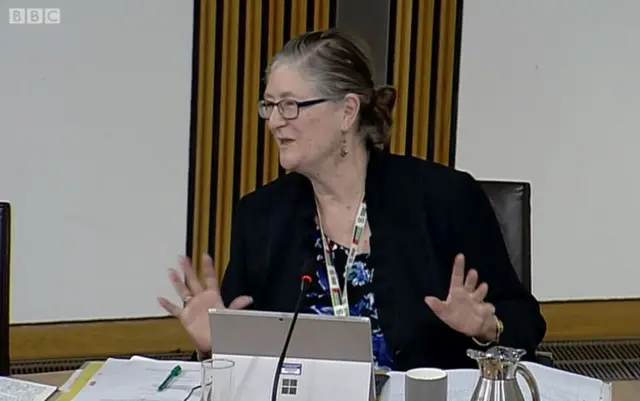
Labour MSP Claudia Beamish
Labour MSP Claudia Beamish asks about the final long-term targets of 90% and net zero.
Will Webster of Oil and Gas UK says technologies must be developed to be able to reach the 90% target.
We need CCS to achieve anywhere near 80-90% reduction, he says.
Fabrice Leveque of Scottish Renewables says the science is clear we should be aiming for net zero.
But he also calls for near-term measures, though these milestones are not necessary all the way to 2050.
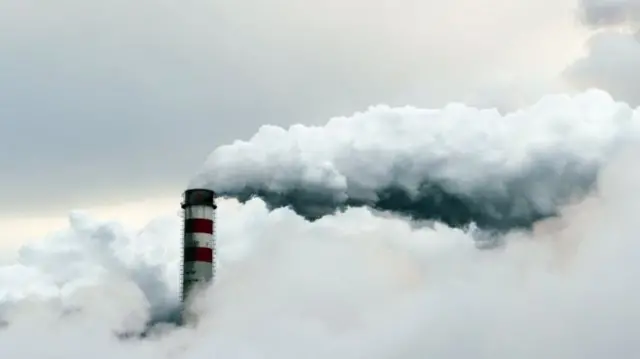 Image source, Getty Images
Image source, Getty ImagesThe UK is taking a tentative step towards a radical "green" future with zero emissions of greenhouse gases.
The UK and Scottish governments have formally sought Committee on Climate Change guidance about how and when to make this leap.
If it happens it would mark an extraordinary transformation of an economy built on burning fossil fuels.
The decision was prompted by last week's UN report warning that CO2 emissions must be stopped completely to avoid dangerous climate disruption.
Allow X content?
This article contains content provided by X. We ask for your permission before anything is loaded, as they may be using cookies and other technologies. You may want to read X’s cookie policy, external and privacy policy, external before accepting. To view this content choose ‘accept and continue’.
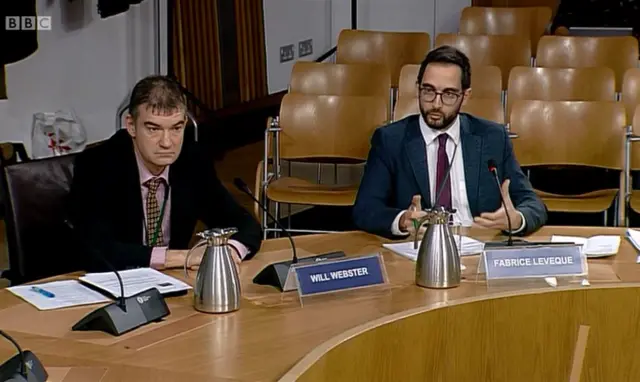 Image source, bbc
Image source, bbcFabrice Leveque from Scottish Renewables
Fabrice Leveque from Scottish Renewables says with electrification there would be less fossil fuel use and there are some concerns about the use of hydrogen as an alternative, as there is quite a lot of work to be done there.
Mr Leveque argues there is more to be done with heat pumps, as has been done with wind turbines.
He says today, thanks to the rapid decarbonisation of the electricity grid, heat pumps have reduced their carbon foot print.
He warns work on hydrogen must not detract from the work on technologies like heat pumps.
Allow X content?
This article contains content provided by X. We ask for your permission before anything is loaded, as they may be using cookies and other technologies. You may want to read X’s cookie policy, external and privacy policy, external before accepting. To view this content choose ‘accept and continue’.
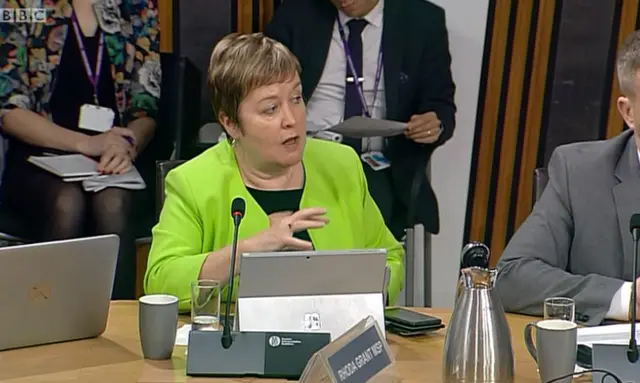 Image source, bbc
Image source, bbcLabour MSP Rhoda Grant
Elizabeth Leighton of the Existing Homes Alliance Scotland warns that the low carbon transition does not impact on the efforts to reduce fuel poverty.
Ms Leighton highlights the need for very energy efficient houses and says those who cannot afford this must be helped.
Labour MSP Rhoda Grant asks if there is enough for those in the middle, like people in drafty old crofts in her constituency.
Ms Leighton says that is one reason she has argued the budget needs to be aligned with meeting the targets set by Energy Efficiency Scotland.
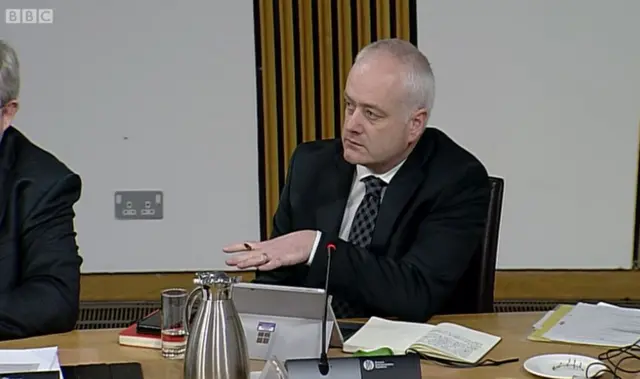
Green MSP Mark Ruskell
Green MSP Mark Ruskell asks about the sectoral approach.
Dr Diana Casey says the climate change action plan is a start of a conversation with government for her sector.
We need funding for demonstration projects and other support, she says.
Brexit introduces a huge amount of uncertainty for this, the MPA representative says.
Quote MessageI'd be very worried if anybody pinned the future of the planet on the market and hoped it would come to save you. It won't."
Professor Paul Jowitt, Heriot Watt University academic
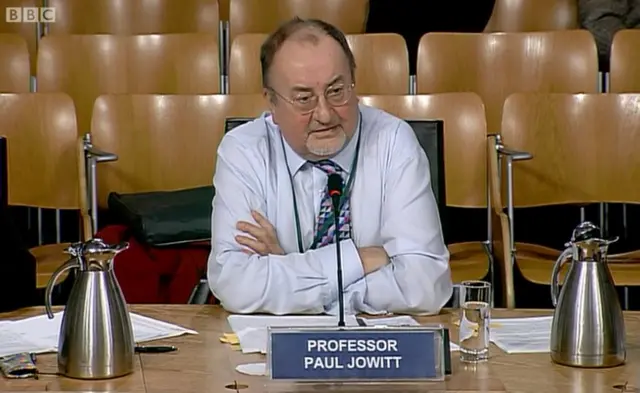 Image source, bbc
Image source, bbcProfessor Paul Jowitt from Heriot Watt University
Professor Paul Jowitt from Heriot Watt University says the big hits in reducing carbon emissions has been exporting them to developing countries, which has been a quick win.
The academic warns the longer term targets require behavioural change which will be much harder to do.
Prof Jowitt says we must not look to technology as a silver bullet, as tackling climate change will require a response from all of us.
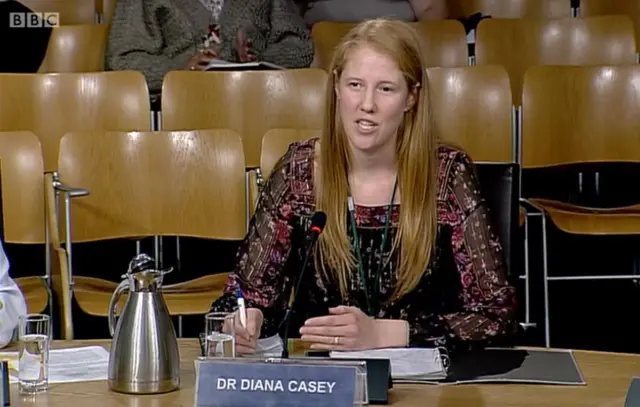
Dr Diana Casey of the MPA
Dr Diana Casey of the Mineral Products Association says a key issue is how the burden of meeting the targets is shared across sectors.
Some sectors are harder to decarbonise, she says, and it is important to maintain competitiveness.
Fabrice Leveque from Scottish Renewables says firmer targets give businesses more certainty and clarity.
There is a difference between setting a date and just highlighting net-zero emissions as a general ambition, he explains.
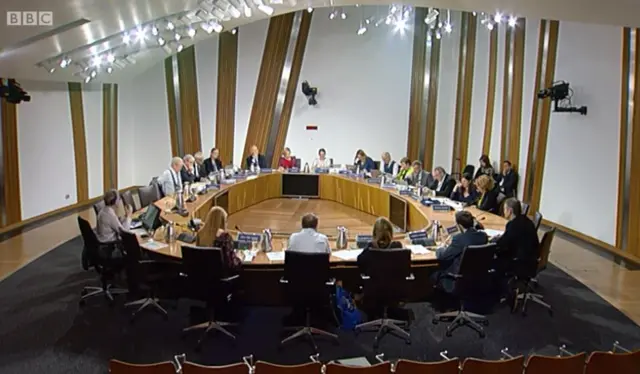
Green MSP Mark Ruskell says the signs for the oil and gas sector are not looking good.
Mr Ruskell asks what the plan B is because on the face of it, the sector looks finished.
Mr Webster says the next 15 years look good and he points out global forecasts show a gap on the supply of oil and gas.
He adds Scotland has become a leader on climate policy by setting realistic targets, that are done in a flexible way so that the transition is difficult but is something consumers and the economy can take.
Decarbonised gas must be a part of the long term picture, as must oil he explains.
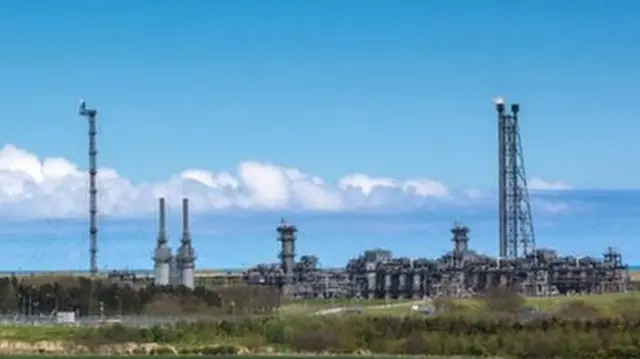 Image source, JOHN BOROWSKI
Image source, JOHN BOROWSKIExperts say the St Fergus gas terminal could be used to pump CO2 into North Sea reservoirs
Committee convener Gillian Martin asks if there should be a shift in the use of hydrocarbons away from heat and electricity supply.
Mr Webster argues CCS requires the next stage of development to be put on a statutory footing by the government.
What is CCS?
The idea behind Carbon Capture Storage is to collect greenhouse gas emissions from power stations and pump the captured CO2 underground, preventing it reaching the atmosphere.
Experts say CO2 could be pumped down existing pipelines into reservoirs beneath the North Sea.
They are calling for the UK government to invest in its development.
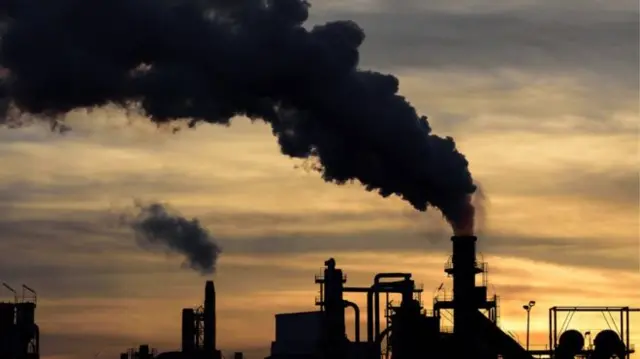 Image source, Getty Images
Image source, Getty ImagesGreenhouse gas emissions in Scotland have almost halved since 1990, according to the latest figures.
Government statistics, external show levels in 2016 were 49% below the 1990 baseline, with a 10.3% drop on the previous year.
The adjusted figure, which includes Scotland's share of an EU-wide emissions trading system, fell by 45.2%.
The drop has been largely attributed to the 2016 closure of the Longannet Power Station.